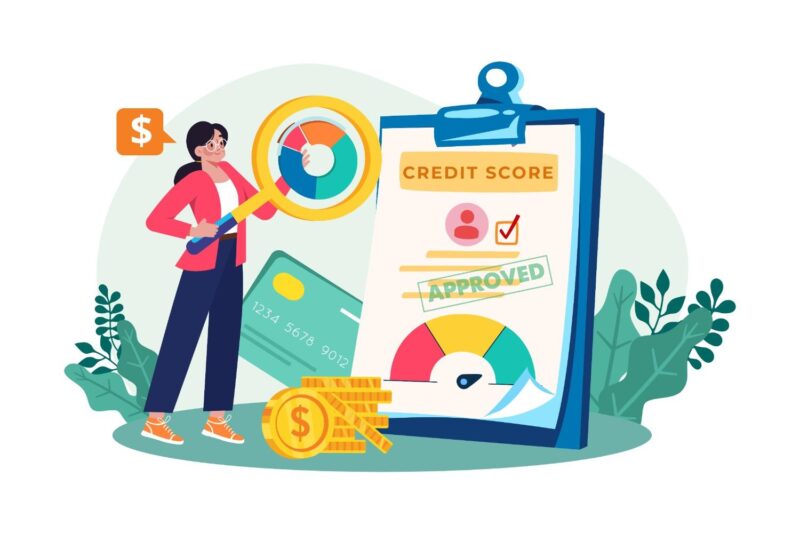The lender regularly checks your credit history when you apply for a loan or credit card, including whether or not you have recently requested new credit. We refer to these investigations as credit enquiries. Unexpectedly, submitting too many credit enquiries in a short period of time can raise concerns for lenders, which might result in your loan application being turned down. The discussion below will explore how multiple credit enquiries can impact your loan application and affect your credit score. We’ll also offer advice on how to handle enquiries effectively.
What are credit inquiries?
Let’s identify a credit inquiry before starting the process,
- When you check your own credit score or when a lender or company carries out a quick check without your request for a new credit line, this is known as a “soft inquiry.” Your credit score is not impacted by soft enquiries.
- Whenever you (or a lender) apply for new credit, such as a mortgage, credit card, or loan, this is known as a hard inquiry. Your credit score may be impacted by hard inquiries, which show up on your credit report, particularly if there are a lot of them very quickly.
Multiple credit enquiries on a loan application could be viewed by lenders as evidence that you are overly dependent on the money you borrowed or are experiencing financial difficulties. Your chances of being accepted could decrease as a result.
How credit inquiries affect credit score & loan chances
A small decline in credit score
A single hard question often results in a small drop (perhaps a few points). However, the long-lasting impact may be more noticeable if you have multiple within a few months.
Lenders’ short-term indicators of danger
If you submit several loan applications in a short period of time, lenders might wonder if you’re overextending yourself. Your risk profile may rise as a result.
Decreased ability to take out loans
Lenders may increase your interest rate or reduce the amount they are willing to lend you, even if your credit score hasn’t dropped much.
Extended examination or absolute refusal
A large number of recent enquiries may balance the scales in competitive lending decisions. A lender may reject the application completely or delay approval.
Olyv’s view: Credit inquiries and their health
Olyv includes credit health checks during its lending process in addition to facilitating fast personal loans.
Let’s look at how they responded to credit enquiries,
Evaluation of credit health
Payment history, utilisation, credit mix, and recent credit enquiries are some of the indicators Olyv uses to evaluate your credit health.
Limiting new applications is suggested
Olyv suggests users stay away from making several credit enquiries in a short amount of time, as this may suggest financial difficulty to lenders.
- Transparently pre-qualify
Olyv allows a certain amount of transparency. You can view the possible loan options before submitting an official application, saving your time and effort.
Quick and digital approvals
Olyv aims to facilitate quick personal loan approvals with little paperwork once everything is in place, including an appropriate inquiry history.
Accordingly, Olyv users have a better chance of gaining favourable conditions or quick approval if they have fewer pointless credit enquiries.
Real-world impact: Story of two applicants
For example, let’s say that Rajesh and Meena both want personal loans.
- Last month, Meena applied for a small personal loan. Two weeks later, she applied for a credit card. Now, she wants another loan. In a month, she is going to face three challenging questions.
- After refusing several applications and checking his credit score (a soft inquiry), Rajesh is now applying for a loan.
Meena’s multiple recent enquiries may make her loan application carefully reviewed, even if she and Rajesh have comparable incomes or credit histories. She might be forced into a higher interest rate or seen as riskier by lenders. On the other hand, Rajesh appears to be more secure with fewer or no recent credit enquiries.
Tips to manage credit inquiries smartly
Here are some easy steps to make sure that a lot of credit checks do not harm your loan application.
Use a short “window” to complete your rate shopping.
Within 14 to 45 days, some credit bureaus handle several requests for the same loan type as if they were one and the same. Personal loans are less likely to show this than mortgages and vehicle loans. Keep the window as small as possible.
Before applying, meet the prerequisites.
Before making a hard inquiry, use platforms such as Olyv that allow you to view your possible offers.
Don’t apply to multiple lenders at once.
Applications shouldn’t be armed with guns. Before applying, choose one or two trustworthy lenders.
Applications should be spread out.
Wait a few months, work on your credit, and then try again if your application is rejected.
Address the basic health of your credit.
Solve late payments, maintain low utilisation, and pay off outstanding debts. Even if you have a few questions, this helps lower the level of fear.
Look for errors in your credit report.
Occasionally, what appear to be a large number of enquiries are either fraudulent or duplicates. Problems that you are not familiar with.
Conclusion
Multiple credit inquiries can lower your credit score and decrease your chances of getting approved for a loan, especially if they are hard inquiries made rapidly. Multiple applications are seen by lenders as a sign of financial difficulty. Your credit health is evaluated by platforms such as Olyv, which look at things like utilisation, payment history, and recent enquiries. Avoid applying to more than one lender at once, make use of pre-approval tools, and keep a regular check on your credit report to increase your chances of getting approved for a loan. Your loan application could be approved or rejected depending on how you handle credit enquiries.




